Why a Strong Cover Letter Matters for a Judicial Internship
A judicial internship is a highly sought-after opportunity, offering invaluable experience and insights into the legal system. Your cover letter is often the first impression you make on a judge or their clerk, and it plays a crucial role in determining whether you’ll be considered for an interview. Unlike resumes that provide a factual overview, a cover letter allows you to showcase your personality, express your passion for law, and highlight how your specific skills and experiences align with the internship’s requirements. A well-crafted cover letter demonstrates your attention to detail, writing proficiency, and genuine interest, all essential qualities for a successful judicial intern. A poorly written or generic cover letter can easily lead to your application being overlooked, so investing time and effort in crafting a compelling letter is paramount to getting noticed.
Highlighting Your Qualifications
Your cover letter should effectively communicate your qualifications, demonstrating that you possess the skills and knowledge necessary to excel in a judicial internship. Focus on showcasing relevant experiences and academic achievements that align with the judge’s area of expertise or the court’s specific needs. Avoid simply restating your resume; instead, elaborate on your experiences, providing specific examples that illustrate your abilities and the value you can bring to the internship. Remember to tailor your qualifications to each specific opportunity. Research the judge and the court to understand their priorities and tailor your letter to directly address their needs, emphasizing those experiences and skills that are most relevant.
Relevant Coursework and Academic Achievements
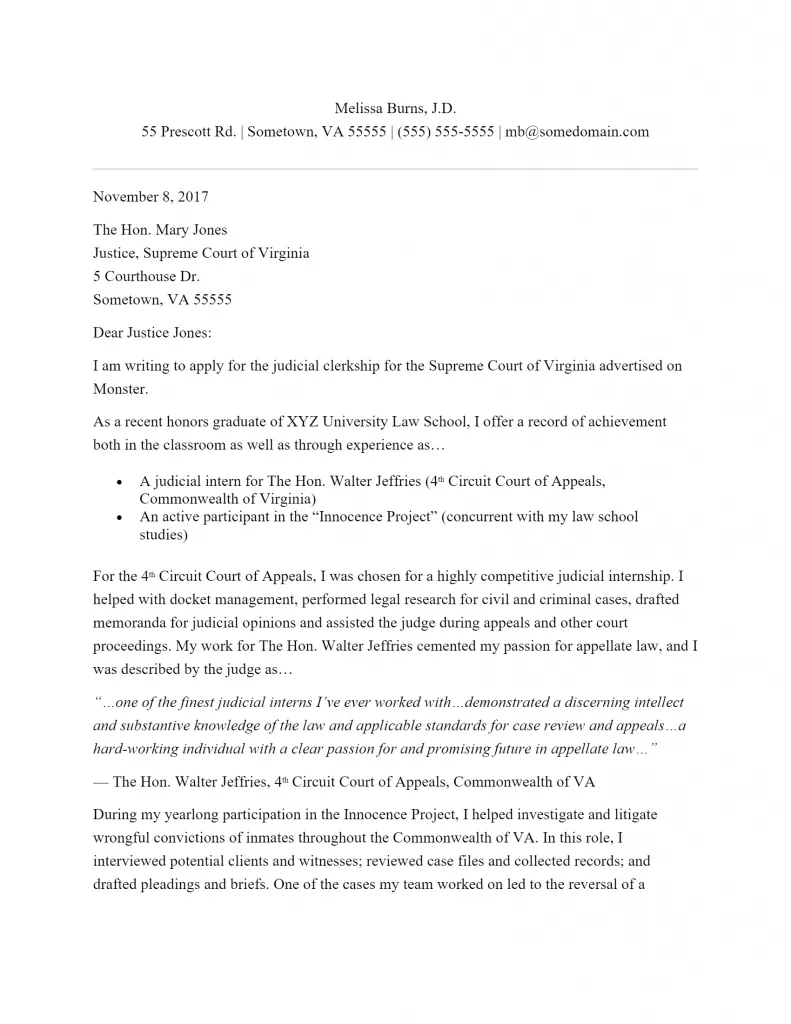
Mention specific courses you’ve taken that are relevant to the judicial internship, such as constitutional law, civil procedure, or criminal law. Highlight academic achievements, such as high grades, law review membership, or moot court participation. Provide brief details about your coursework, especially if you have experience in a specific area of law that the judge is known for. Demonstrating a strong academic foundation is crucial. Showcasing your accomplishments in legal studies demonstrates your commitment to legal principles. If you have received any academic awards or honors, be sure to include them. A strong academic record indicates a candidate’s dedication to learning and preparedness for the internship.
Legal Research and Writing Experience
Judicial interns spend a significant amount of time on legal research and writing. Highlight any experience you have in these areas, such as writing legal memoranda, briefs, or court documents. Mention any research projects you’ve undertaken, including the databases you used (Westlaw, LexisNexis, etc.). Describe your experience writing, including any writing courses, legal writing competitions, or publications. For example, if you’ve written a persuasive legal argument, briefly summarize your work. Providing concrete examples of legal writing or legal research shows your skills, as well as experience.
Extracurricular Activities and Leadership Roles
Demonstrate your involvement in extracurricular activities such as moot court, mock trial, or law review. If you held a leadership position in a student organization, such as president or treasurer, it demonstrates your organizational skills. Briefly describe your role and responsibilities within these organizations. Include your participation in relevant volunteer work or pro bono activities that show your commitment to the legal profession. Showing your leadership skills and participation in relevant activities is crucial. Discuss how these activities have helped you develop skills that can be used in the judicial internship.
Demonstrating Your Passion and Interest
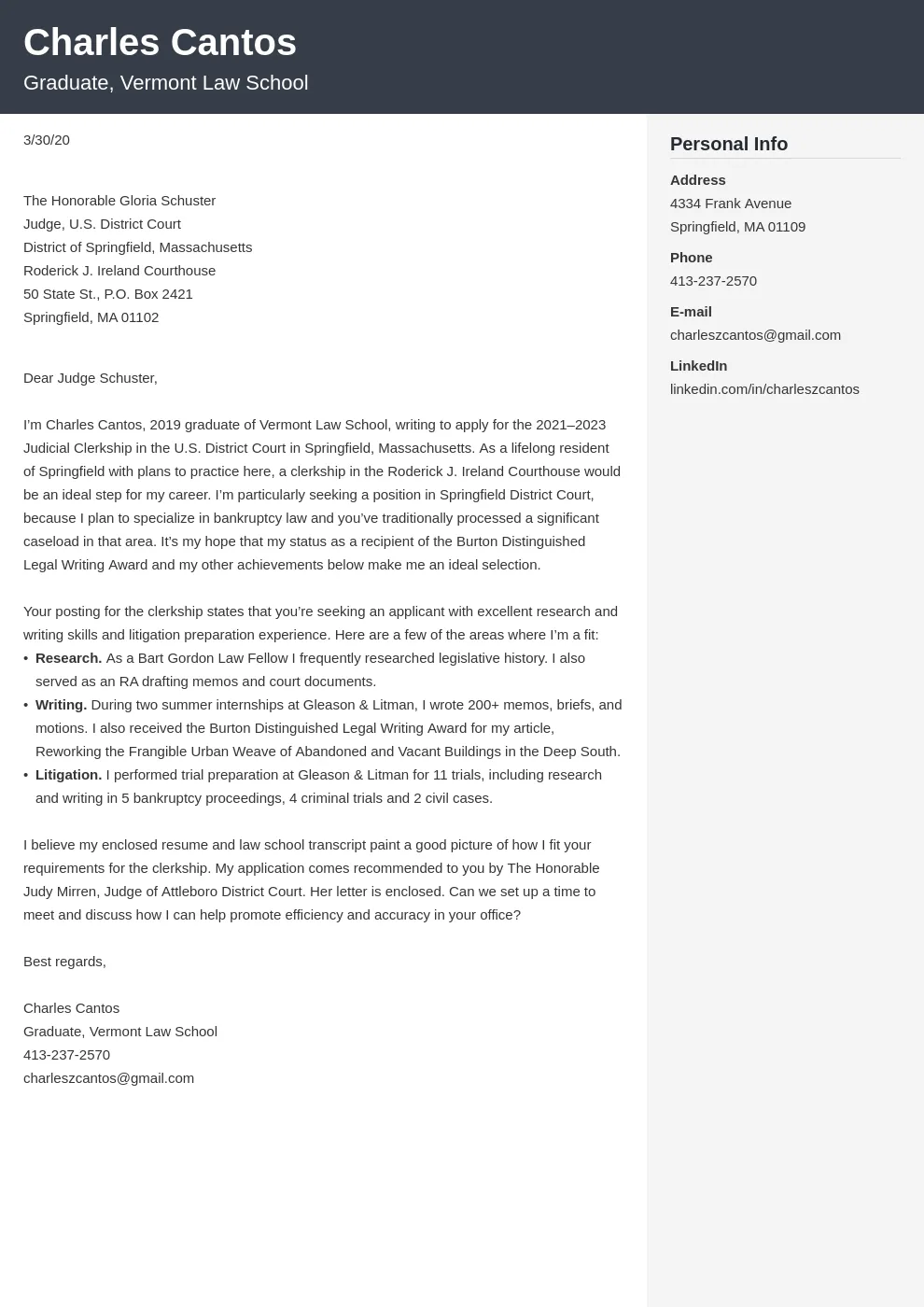
Judges often seek interns who are genuinely interested in the law and the judicial process. Express your passion for the law and your specific interest in the judge’s work. Explain why you are drawn to a judicial internship and what you hope to gain from the experience. Demonstrating your enthusiasm is one of the most crucial aspects of your cover letter. Show how the internship aligns with your long-term career goals and aspirations. Connect your interest in the law to the judge’s specific area of expertise. Articulate a clear vision of what you would like to accomplish during the internship to convince the judge of your genuine dedication.
Expressing Genuine Interest in the Judge and Court
Show that you’ve done your homework by mentioning specific aspects of the judge’s career, rulings, or publications that resonate with you. Mention specific cases or legal areas the judge is known for. This shows you’ve taken the time to learn about the judge’s background. Explain why their work interests you and what you admire about their approach to justice. Highlight the value of interning in the particular court. Tailoring your letter demonstrates that you are not just sending a generic application but are genuinely interested in working with that specific judge and within that court system.
Researching the Judge and Their Work
Thoroughly research the judge’s background, legal experience, and published opinions. Utilize online resources such as the court’s website, legal databases, and news archives. Read some of their key rulings. Identify any areas of law or legal issues the judge is known for. Examine their background and any prior experience before becoming a judge. This will show that you are genuinely interested in the judge’s work and you’re invested in learning from them. Take note of any awards or recognitions the judge has received.
Tailoring Your Letter to the Specific Court
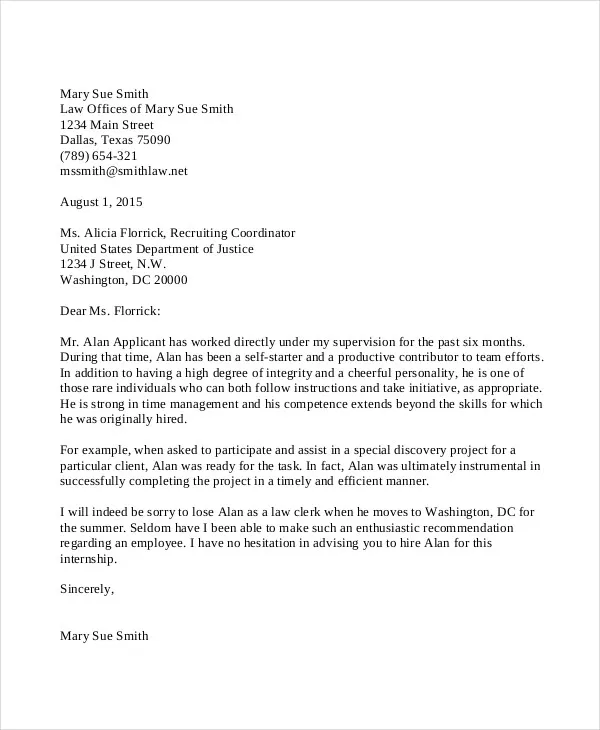
Understand the court’s jurisdiction, procedures, and the types of cases it handles. Research the court’s website, annual reports, and any available information about the internship program. Mention the specific court, judge, and position you are applying for. Tailor your cover letter to reflect your understanding of the court’s operations and needs. Your awareness of the court’s environment and needs shows that you have done your research and are genuinely invested in joining their judicial team. Be sure to check if they have a specific application process or requirements. Showing that you have tailored your cover letter for this specific court increases your chance of being selected.
Showcasing Essential Skills
Judicial internships require a unique combination of skills. You should emphasize your ability to manage multiple tasks, pay close attention to detail, and communicate effectively. Highlight your capacity to grasp complex legal issues quickly and provide well-reasoned analysis. Your cover letter is an opportunity to highlight these abilities. Provide specific examples that demonstrate your skills in each of these areas. Your cover letter can set you apart from other candidates by showing how you’ve developed and refined your skills. You must provide evidence to support your claims and demonstrate their value.
Attention to Detail
Judges and their clerks rely on meticulous attention to detail. Describe your experience in activities or projects where you have had to pay close attention to detail. Examples include proofreading legal documents, conducting thorough research, or reviewing contracts. Share specific examples of times when your attention to detail was essential to successfully completing a task. Mention any software or tools you are proficient in that require a high level of accuracy. Ensure your cover letter is free of errors, including grammatical errors, spelling mistakes, and formatting inconsistencies. This is the first test of your attention to detail.
Strong Communication Skills
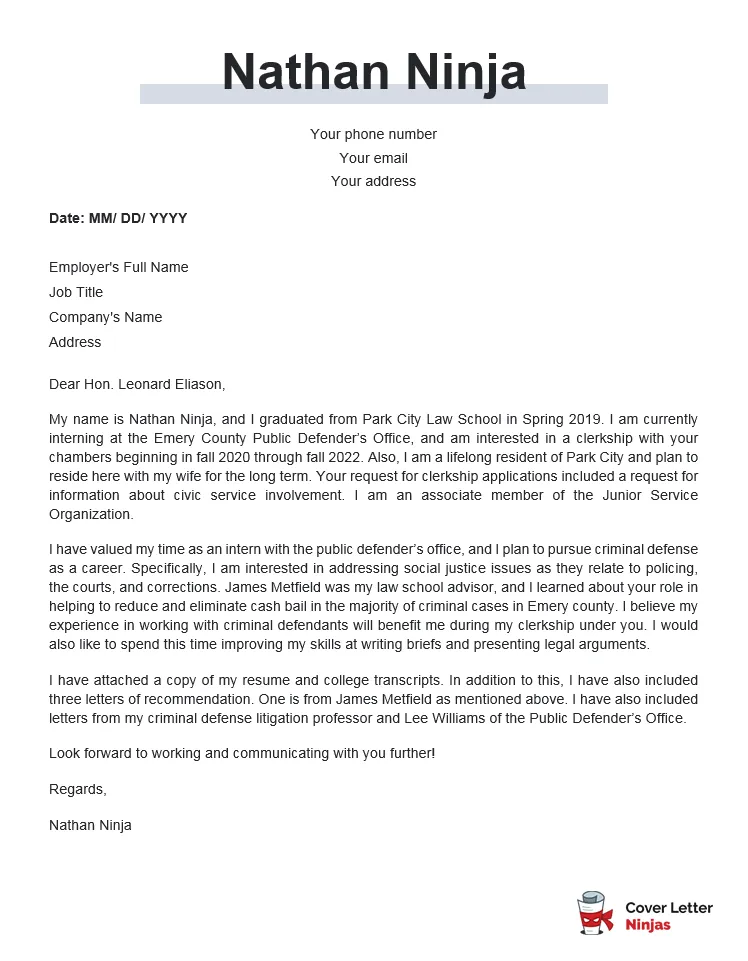
Strong communication skills are essential for effective legal writing and clear communication. Describe your experience giving presentations, writing persuasive arguments, and engaging in discussions. Mention any relevant coursework or training you have completed in writing or public speaking. Provide specific examples of times when you successfully communicated complex information clearly and concisely. Articulate your ability to adapt your communication style to different audiences, such as judges, lawyers, and the public. Show your ability to express your thoughts clearly, as this is essential in legal writing and verbal communication.
Analytical and Problem-Solving Abilities
Judicial interns must be able to analyze complex legal issues, identify relevant facts, and develop logical arguments. Describe your experience in legal research and writing. Mention any experience you have in critical thinking, logical reasoning, or problem-solving. Provide specific examples of times when you analyzed a complex issue, identified the key elements, and developed a solution. Highlight any specific analytical frameworks you are familiar with or experienced using. Demonstrate your capacity to identify and address challenges.
Cover Letter Formatting and Style
The format and style of your cover letter must be professional. Adhere to standard business letter format, including your contact information, the date, the recipient’s contact information, a formal salutation, the body of the letter, a closing, and your signature. Use a clear, concise, and professional tone. Keep your sentences short and to the point, avoiding overly complex or jargon-filled language. Your cover letter should make a strong impression. Consider that your letter must reflect the legal profession’s standards.
Professional Tone and Language
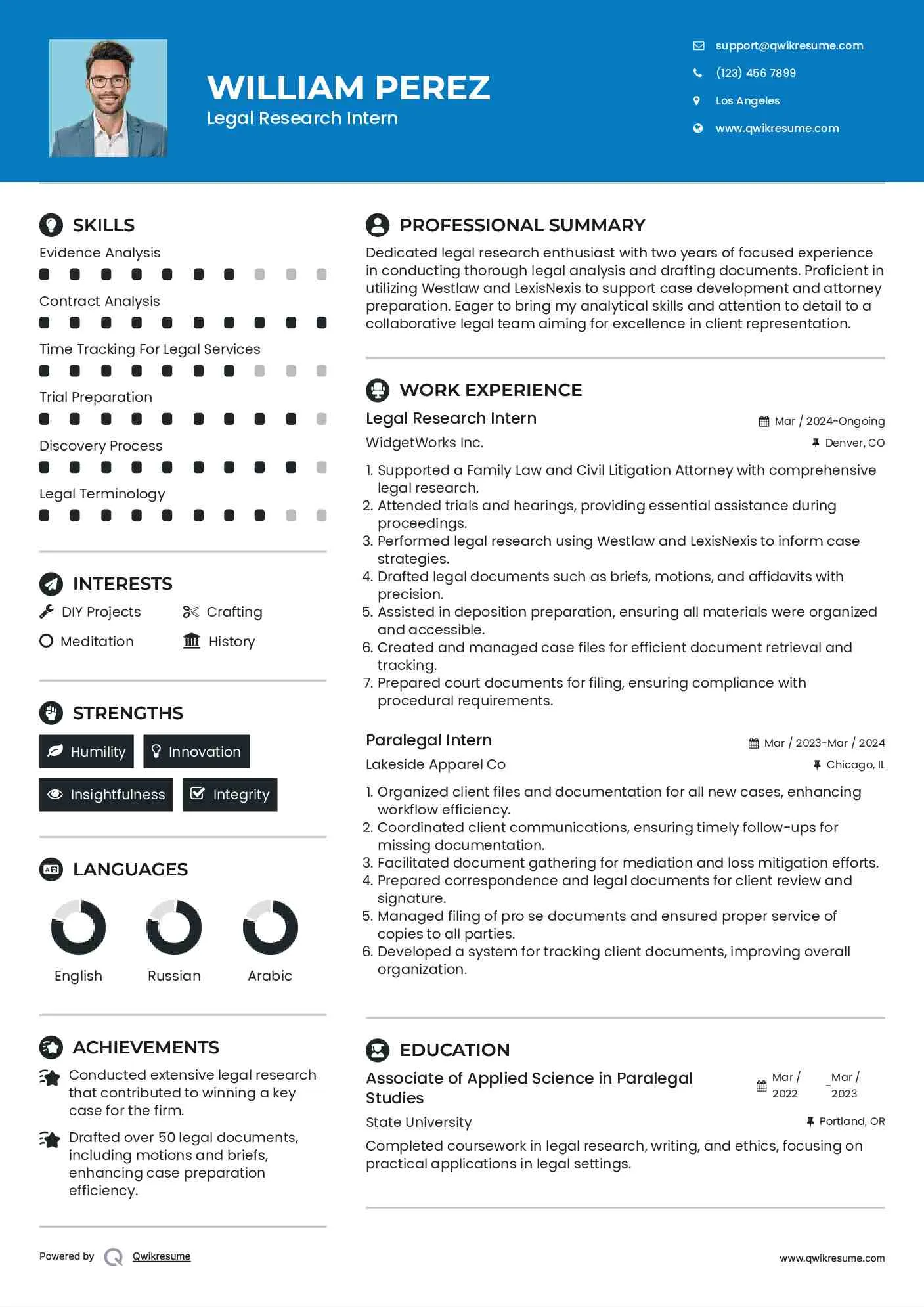
Use formal and respectful language throughout your cover letter. Avoid slang, colloquialisms, and overly casual language. Focus on highlighting your skills and qualifications and expressing your interest in the internship. Maintain a positive and enthusiastic tone, but avoid sounding overly eager or desperate. Ensure that your tone is appropriate for the legal context. Focus on showcasing your abilities and providing a clear and compelling narrative.
Proper Formatting and Proofreading
Use a professional font, such as Times New Roman or Arial, and maintain consistent font size and spacing throughout the letter. Proofread your cover letter meticulously for any grammatical errors, spelling mistakes, or formatting inconsistencies. Have someone else review your cover letter to catch any errors you may have missed. Proofreading your cover letter is vital. These errors can make a negative impression on the reader. Make sure your cover letter is well-organized and easy to read. Correct any typos, formatting issues, or grammatical problems. Using tools like Grammarly can help with proofreading, but the most important thing is that you do it.
Contact Information and Closing
Include your full name, address, phone number, and email address at the top of your cover letter. Provide a professional email address. Use a formal salutation, such as “Dear Judge [Last Name]” or “Dear [Judge’s Title] [Last Name].” Conclude your letter with a professional closing, such as “Sincerely” or “Respectfully.” Express your gratitude for the judge’s time and consideration. Reiterate your interest in the internship and offer to provide any additional information they may need. Include the best way for the recipient to contact you. Then, finish with your full name and signature.
Next Steps After Submitting Your Cover Letter
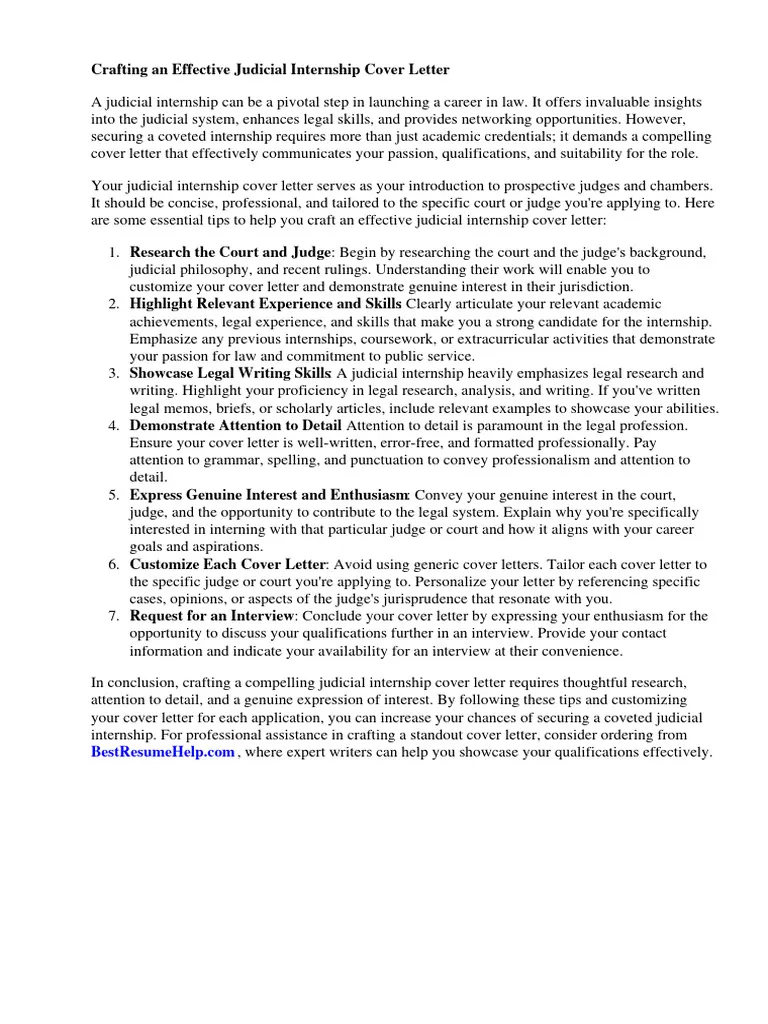
After submitting your cover letter and resume, be prepared for the next steps in the application process, which may include an interview. Research common interview questions for judicial internships and prepare your answers. Have questions ready to ask the judge or their clerk. If you don’t hear back within the specified timeframe, consider following up with a polite email or phone call to inquire about the status of your application. Always express your continued interest. Express gratitude for their time and consideration. Preparing for the next steps can significantly increase your odds of success.
